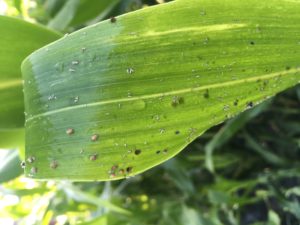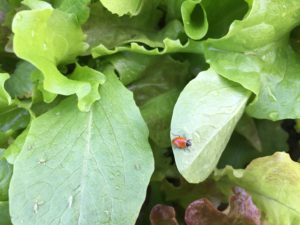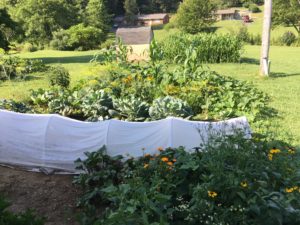Attract Your Allies: Make Your Garden Inviting to Beneficial Insects
go.ncsu.edu/readext?526186
en Español / em Português
El inglés es el idioma de control de esta página. En la medida en que haya algún conflicto entre la traducción al inglés y la traducción, el inglés prevalece.
Al hacer clic en el enlace de traducción se activa un servicio de traducción gratuito para convertir la página al español. Al igual que con cualquier traducción por Internet, la conversión no es sensible al contexto y puede que no traduzca el texto en su significado original. NC State Extension no garantiza la exactitud del texto traducido. Por favor, tenga en cuenta que algunas aplicaciones y/o servicios pueden no funcionar como se espera cuando se traducen.
Português
Inglês é o idioma de controle desta página. Na medida que haja algum conflito entre o texto original em Inglês e a tradução, o Inglês prevalece.
Ao clicar no link de tradução, um serviço gratuito de tradução será ativado para converter a página para o Português. Como em qualquer tradução pela internet, a conversão não é sensivel ao contexto e pode não ocorrer a tradução para o significado orginal. O serviço de Extensão da Carolina do Norte (NC State Extension) não garante a exatidão do texto traduzido. Por favor, observe que algumas funções ou serviços podem não funcionar como esperado após a tradução.
English
English is the controlling language of this page. To the extent there is any conflict between the English text and the translation, English controls.
Clicking on the translation link activates a free translation service to convert the page to Spanish. As with any Internet translation, the conversion is not context-sensitive and may not translate the text to its original meaning. NC State Extension does not guarantee the accuracy of the translated text. Please note that some applications and/or services may not function as expected when translated.
Collapse ▲When you ask a vegetable gardener about insects in their garden, the typical reaction is to cringe and tell you their tried-and-true way of getting rid of them! Most people think of insects as foes, rather than friends. But did you know that there are many insects that can actually help us keep the “bad” insects at bay? These helpful critters are called “beneficial” insects. They can help reduce the populations of problem pests in the garden. But in order to do so, we must provide them with habitat to do so.
Beneficial insects include parasitic wasps, ground beetles, lady beetles, lacewings, and others.

Parasitic wasps will lay eggs in the body of an aphid. Once the eggs hatch, the larvae feed on the aphid, which will eventually die.
Parasitic wasps control pests by laying eggs on or in the bodies of pests, and as the eggs hatch they feed on the pest, slowly killing it. One example of this is the Braconid wasp that lays its eggs in a tomato hornworm. Once the larvae hatch inside the hornworm, the spin white cocoons attached to the hornworm and will emerge as adults several days later. Parasitic wasps also lay eggs in aphids. Ground beetles will feed on slugs, and they also will eat weed seeds.

A ladybeetle spotted near aphids on lettuce. Lady beetles are predators of aphids, whiteflies, scales, and other insects.
Lady beetles are more commonly known as “good bugs”, though they themselves can be pests inside a household. There are many different species of lady beetles. They will feed on common pests such as aphids, mealybugs, whiteflies, and even scale insects.
There are many plants that host or attract beneficials but several plant families are particularly attractive to beneficials. One of those plant families is the carrot family, Apiaceae. Plants in this family that are particularly attractive are dill, fennel, cilantro, Bishop’s flower, and Queen Anne’s Lace. These plants tend to attract parasitic wasps and flies. It is important to let them flower if you want to attract the beneficial insects, and fortunately their flowers are very attractive! Interplant these among your vegetables to keep beneficials on duty.
Plants in the daisy or aster family (Asteraceae) and the verbena family (Verbenaceae) are attractive to both beneficial insects and to the human eye! These plant families have many of our popular flowers.

Including plants that attract beneficial insects helps with pest control and adds color to the vegetable garden, too.
Good flowers for beneficials in the aster family include sunflowers, marigolds, yarrow, calendula, coneflower, and coreopsis. Asters are especially attractive to beetles and lady beetles. Plants in the verbena family attract a variety of beneficials. Good plants in this family include lantana, hybrid verbena, and lilac vervain. Certain plants in the legume family (Fabaceae), such as sweet clover, hairy vetch, and fava bean, are grown as cover crops to protect soil and add nutrients to the soil when another crop is not growing. They are also attractive to a number of beneficial insects.
For the best habitat, intersperse a mix of attractant plants in your vegetable garden, or consider dedicating a bed to be for a “beneficial insect mix”. Besides planting flowers, a diverse landscape including well-managed lawn, trees, shrubs, and perennials that provide flowers throughout the season can help sustain beneficial insects. Undisturbed areas such as a perennial landscape or forest edge provide a place for overwintering. Mulch in the vegetable garden provides habitat for ground beetles. Beneficial insects also need water. An easy way to provide it is in a shallow pot saucer with pebbles in it for the insect to land on.
While having a healthy population of beneficial insects will reduce your need to apply pesticides, there is still a possibility that you will need to apply a pesticide to control insects or slugs during the season. Be aware that pesticides can harm beneficial insects in addition to pests. Before spraying, make sure the insects you see are pests and not beneficials. To reduce the effect on beneficials, apply pesticides only when needed. Choose pesticides with little residual activity, such as insecticidal soap or horticultural oil. Apply pesticides in the evening and avoid contact with flowers that attract beneficials will also reduce the exposure beneficial insects have with the pesticide.
A fun summer project for any child could be collecting and identifying insects in the garden. Ask them to track which “good bugs” are visiting and if they see any parasitism or predation. To learn more about beneficial insects, see this page by Dr. Lucy Bradley. For more information on vegetable gardening or for help identifying insects in your garden, contact the N.C. Cooperative Extension-Caldwell County Center at 828-757-1290, Monday – Friday, 8:00 a.m. – 5:00 p.m.




